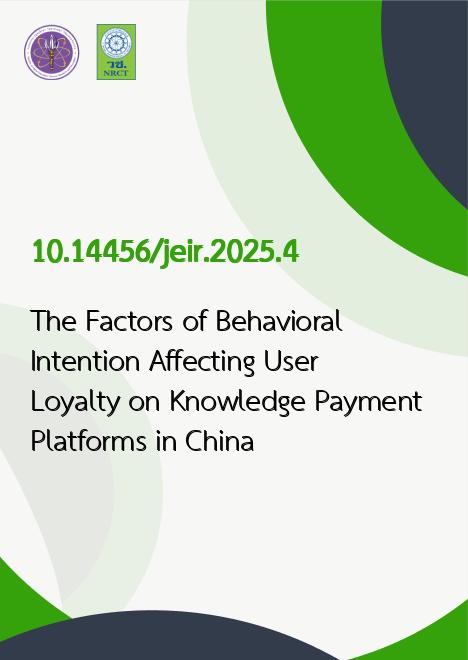
|
The Factors of Behavioral Intention Affecting User Loyalty on Knowledge Payment Platforms in China |
|---|---|
| รหัสดีโอไอ | |
| Creator | Luo Beibei |
| Title | The Factors of Behavioral Intention Affecting User Loyalty on Knowledge Payment Platforms in China |
| Contributor | Patima Rungruang, Ampol Navavongsathian |
| Publisher | สถาบันเทคโนโลยีนวัตกรรมทางการศึกษาและการวิจัยแห่งสุวรรณภูมิ (สนว.) |
| Publication Year | 2568 |
| Journal Title | วารสารนวัตกรรมการศึกษาและการวิจัย |
| Journal Vol. | 9 |
| Journal No. | 1 |
| Page no. | 56-74 |
| Keyword | Knowledge Payment Platforms, Behavioral Intention, User Loyalty, Structural Equation Model, UTAUT Model |
| URL Website | https://so03.tci-thaijo.org/index.php/jeir |
| ISSN | 3027-6446 |
| Abstract | Background: In the increasingly competitive and segmented market of knowledge payment platforms in China, it is essential to grasp the aspects that effect behavioral intention and user loyalty in order to ensure the long-term viability of the platform. Aims: The current research aims to examine the variables that influence behavioral intention and user loyalty on knowledge payment platforms in China. Methodology: To achieve this, a complete theoretical model is developed, drawing upon the Unified Theory of Acceptance and Use of Technology (UTAUT), perceived risk theory, and user loyalty theory. The proposed model incorporates social influence, performance expectancy, effort expectancy, and perceived risk as independent variables. It evaluates the direct and indirect effects of these factors on behavioral intention and user loyalty. Results: In this research, a sample of 462 valid respondents obtained from an online survey was analyzed using Structural Equation Model (SEM). The results of the data analysis confirmed that social influence, performance expectancy, and effort expectancy had a favorable impact on behavioral intention and user loyalty. In contrast, there was a significant inhibitory effect on perceived risk. Behavioral intentions, on the other hand, mediated the effects of social influence, performance expectations, effort expectations, and perceived risk on user loyalty.Conclusion: The findings indicate strong empirical support for platform administrators and marketers to implement strategies that enhance user experience, reduce perceived risks, and leverage social influence. Effectively executing these strategies is essential for building customer loyalty and achieving sustained success in the knowledge payment industry. This research provides valuable insights into the relationships among these factors within the context of knowledge payment platforms in China, setting the stage for future research. |
